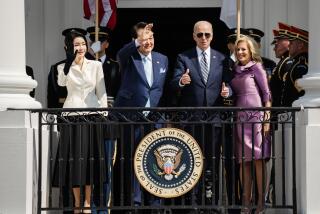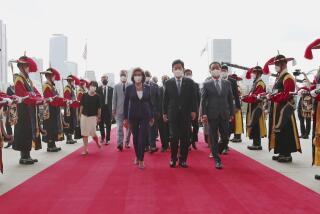Shultz Urges ‘Stability’ in South Korea : Sees Some Regime Opponents, Asks They Reject Strife
- Share via
SEOUL, South Korea — Secretary of State George P. Shultz met today with South Korean opposition leaders and asked them to turn away from confrontation with the military regime of President Chun Doo Hwan.
Shultz brought a stern message to the government foes, who are demanding greater political freedom before the presidential election that Chun has promised in 1988.
However, the United States excluded from the Shultz meeting the two most prominent leaders of the opposition, Kim Dae Jung and Kim Young Sam, who have been firm in their refusal to compromise with the regime.
The United States “strongly supports” increased democracy in South Korea, Shultz said, but he added, “If it’s going to work, there has to be an element of political stability.
‘Not Making a Contribution’
“Violent confrontation such as we’ve seen is not a contribution to that,” he continued. “An opposition that seeks to incite violence is not making a contribution to that.”
Aides said that Shultz plans to repeat those sentiments in a session with both pro-government and opposition political figures later today.
His statement reflected U.S. alarm at increasingly violent anti-government demonstrations here, as well as irritation over the refusal of Kim Dae Jung and Kim Young Sam to cooperate with the regime.
This refusal to cooperate, wire service reports from Seoul have said in recent days, comes as young campus leaders of the Korean protest movement increasingly view the two Kims as elder statesmen, but lacking sufficient militancy.
Direct Vote Demanded
Still, the Kims have condemned Chun’s regime as illegitimate and are demanding that the constitution be changed to allow direct presidential elections.
“We cannot cooperate with the government until it respects the will of the people and agrees to direct elections,” Kim Dae Jung said Wednesday. “I hope Secretary Shultz can encourage the Chun government to give people a free choice.”
The current constitution calls for an electoral college to choose the president, a system that the opposition charges is open to manipulation by the ruling party.
Chun has appealed to the opposition to postpone the debate until after the 1988 elections, which would be South Korea’s first peaceful transfer of power. But his two leading opponents refused and in February launched a petition drive to gather 10 million signatures in favor of direct elections.
“We think the two Kims could be a lot more helpful to the process of moving peacefully toward democracy if they would show a little more patience and willingness to compromise,” a State Department official said.
The U.S. Embassy pointedly did not invite either man to Shultz’s session. Instead, they were asked to meet with Assistant Secretary of State Gaston J. Sigur Jr., who is traveling with Shultz. The two Korean opposition figures refused.
Kim Dae Jung said he was not offended by his exclusion from the Shultz talks because the official leader of his New Korean Democratic Party, Lee Min Woo, had been invited.
He said he hopes that Shultz will press Chun to lift censorship and other restrictions on civil liberties as well as to accept the opposition’s demand for direct elections.
“We are watching the Reagan Administration carefully,” he said. “Unless there is progress, we will see more anti-American feeling and perhaps more serious violence.”
However, a senior State Department official said that Shultz did not press the issue of democratization in his initial meeting Wednesday with Foreign Minister Lee Won Kyung.
And Shultz, who spoke to reporters aboard his plane Wednesday en route from the final session of the Tokyo economic summit meeting, made a point of praising the Chun government on several grounds.
“I think it’s very important for people, deep down, to take in the message that there is a terrific job being done in security and in the economy and an impressive movement going on . . . toward democracy,” Shultz said.
“We do support the government that’s there,” he said. “We have a lot of admiration for the way the Korean people and their institutions have evolved.”
But he added, “I didn’t say the situation is perfect.”
Shultz is scheduled to head for the Philippines tonight for a meeting with President Corazon Aquino.
Asked whether he sees any parallels between South Korea and the Philippines, where a popular uprising and a military revolt combined to overthrow President Ferdinand E. Marcos, Shultz replied, “I think they are about as dissimilar as any two situations you could imagine.”
Shultz said the Korean economy is booming while the Philippines’ is stagnant, and he argued that South Koreans are united by a military threat from Communist North Korea while the Philippines are divided by a Communist insurgency.
More to Read
Sign up for Essential California
The most important California stories and recommendations in your inbox every morning.
You may occasionally receive promotional content from the Los Angeles Times.














